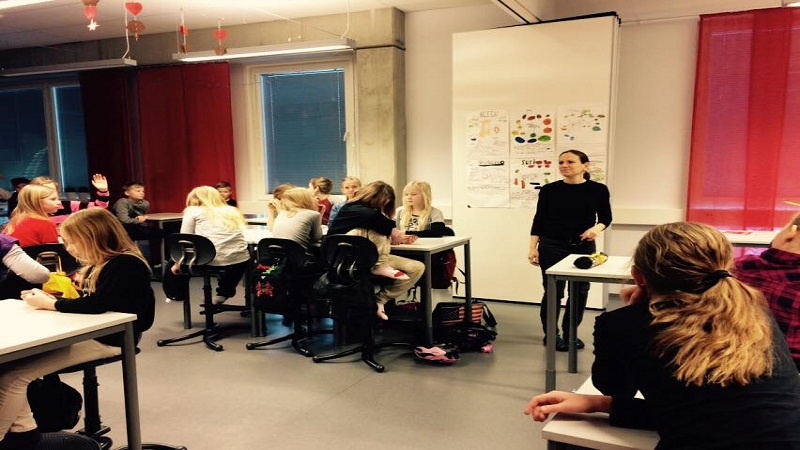Responsibilities in the educational field correspond to parents and teachers to the same extent. We will see a development of how these responsibilities have evolved over time and the current ideal situation.
The responsibilities in the educational field have been much debated in the history of education. The educational process begins in the family and continues in school. The two elements are necessary so that the results obtained in education are correct.
Looking at most known studies, we can say that these responsibilities are shared between parents and teachers. Parents, normally, opt for promoting educational activities that refer to values, social skills and coexistence. Teachers, for those who refer to teach knowledge and education strategies.
Cooperation in the responsibilities in the educational field between families and schools

There are many studies that talk about the relationship between school and family. For example, Ignasi Vila, Professor of Evolutionary Psychology and Education at the University of Girona, in his study in 1998 emphasize the educational need to promote clear cooperation between families and schools.
This study highlights broad positive effects for parents, students and teachers by collaborating in the responsibilities in the educational field.
The family has always been the first agent of socialization in the child’s life. Until the age of 6, this remained the same. But it is something that has been suffering evolutions. Responsibilities in the educational field.
Responsibilities in the educational field evolve with social changes
This has been changing because families have been changing:
- We find ourselves more and more with smaller family nuclei: less brothers, uncles, grandparents.
- Also every time there is less coexistence in the family nucleus.
- Increase single-parent families.
- In addition, the age of beginning of compulsory schooling is advanced.
With the passage of time, the family socialization of children is a responsibility that falls more and more on parents. Social changes occur with negative consequences in the socialization of children. Also, families have to think about new ways to care for their children.
Since the beginning of the twentieth century, teachers teach about more complex subjects and use methods that sometimes have nothing to do with the experience of parents. This occurs because the pedagogical work is becoming specialized.
It begins to be seen that parents seem to have less to say about what goes on inside the school. Thus, it is considered that family and school responsibilities seem different. Parents and teachers begin to look for different objectives, so the relationships between them come into conflict.
Last years
But in recent years, this way of seeing things changes: the idea that school and family have overlapping influences and a shared educational responsibility begins to be defended. They are two institutions that have to cooperate in the education of children.
The importance of family and school being related has been proven. Educational responsibility is something that corresponds to both parties, and there are many reasons that justify it.
Parents have that innate sensibility, necessary to live with children, to listen to the greatest insignificance, to speak with that treatment and affection that we, the teachers, sometimes lose, for the sake of excessive professionalization.
It can cover better than those who do not need it and their right to be more aware of their role as educator, ultimately responsible for the take-off of their child. The teachers will be the experts to help them, but they have to worry about what I, the teacher, do with your child.
Right to Education – Obligations and responsibilities of the State
International law on human rights establishes obligations that States must respect. By ratifying international human rights treaties, States assume binding obligations and obligations under international law on issues related to the respect, protection and fulfillment of human rights.
Main responsibilities of the States
States are the holders of the duties imposed by international human rights law and bear most of the responsibility for the direct provision of the right to education in most circumstances.
Through the ratification of international human rights treaties, governments commit themselves to promote measures at the national level compatible legislation with their treaties of obligations and duties. Every country in the world has ratified at least one treaty that covers certain aspects of the right to education.
The content of the obligations of the States in relation to the right to Education
- Like other human rights, the right to education imposes three levels of obligation on States: respect, protect and fulfill the right to education.
- The obligation to respect requires that States avoid taking measures that hinder or impede the enjoyment of the right to education.
- This classification has been endorsed by the Committee on Economic, Social and Cultural Rights in its General Comments 13 (link is external). This provides a useful analytical framework for considering the obligations of States with regard to the right to education.
- The obligations related to each of the essential features of the right to education have four characteristics: availability, accessibility, acceptability and adaptability.
- Institutions and teaching programs must be available in sufficient quantity.
Main components of the Right to Education
- States must mainly:
- Offer free and compulsory primary education;
- Encourage or intensify “fundamental education” for people who have not received or completed the full cycle of primary education;
- Formulate minimum standards and improve the quality of education;
- Develop the system of schools in all teaching cycles, implement an adequate scholarship system and continuously improve the material conditions of the teaching staff;
- Prohibit discrimination at all levels of education systems;
- Guarantee freedom of choice.
Conclusion
In conclusion, both the family and the school have a common goal: the integral development of boys and girls. Educational responsibility, therefore, is a task that falls on both teachers and parents.
Sometimes you tend to want to let all the responsibility fall on the teachers, but the educational part that starts at home takes place at school, and vice versa.








